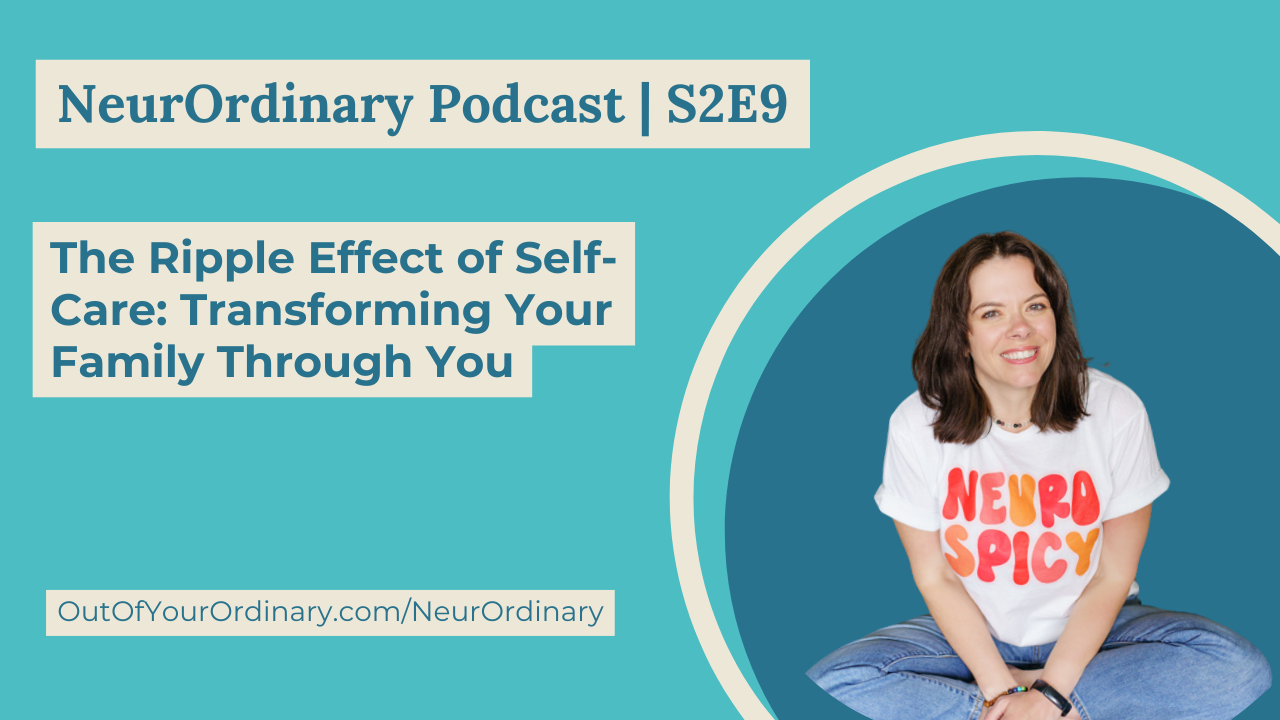
Hey, it’s Karen! Thanks for joining me for another episode of NeurOrdinary. Today, we're diving into a topic really close to my heart: resilience. If you've ever felt overwhelmed as a neurospicy or autism parent juggling therapy appointments, meltdowns, and everyday tasks, this episode is for you. I get how chaotic life can feel!
We start by debunking the myth that resilience means being unshakable. In reality, it's about bouncing back when life knocks you down. I share three actionable strategies to help you build resilience every day.
First, we explore the power of micro-actions – tiny, manageable steps that can create a big ripple effect on your overall well-being. For instance, practicing a simple reset breath during stress can set a calming tone for the rest of your day.
Next, we dig into the idea of reframing your internal dialogue. How you talk to yourself can significantly impact your emotional resilience. Instead of focusing on failures, learn to see struggles as opportunities for growth.
Finally, I emphasize the importance of building your support squad. Having a community or even just one trusted friend can make a world of difference in how you handle life's ups and downs.
I also share inspiring stories from other parents who've transformed their lives by practicing these strategies. Trust me, you're not alone in this journey. For more tips and strategies, download my free Thrive in 5! SOS toolkit – the link is in the show notes.
Remember, resilience isn't about never falling down. It's about getting back up and continuing forward, one small step at a time. Thanks for joining me, and don't forget to keep it spicy!
* Please note: names used in this podcast may have been changed to protect the identity of my coaching clients and their children.
Prefer an audio-only format?! Tune in on Spotify or your favorite podcasting platform.
Don't see your preferred podcast program listed? Contact me here to suggest where you'd like to listen to NeurOrdinary.
Resources Mentioned In This Episode
- Check out The Self-Care Support Squad Substack (join for only $7/month to get access to exclusive bonus content, monthly group coaching calls, and more great resources!)
- Snag your FREE Thrive in 5! SOS Toolkit here!
Transcript
Hey, I’m Karen. And I’m a mom to two amazingly neuropsicy autistic kiddos. If you’re an autism parent like me, you know I don’t have the time to make a podcast intro. I also lack the tech skills, so let’s just get into it…this is the NeurOrdinary Podcast!
Hi there, and welcome to another episode of NeurOrdinary! I’m Karen Kossow, your self-care and resilience coach, a fellow neurospicy autism parent, and someone who truly gets how chaotic life can feel when you’re balancing the unique challenges of parenting and navigating neurodivergence, whether it’s your own, your kids’ your partners, whoever! If you’re here, I know you’re someone who cares deeply about showing up for your family and yourself. Today, we’re diving into a topic that’s near and dear to my heart: resilience.
Let’s start with a question: when you hear the word “resilience,” what comes to mind? Maybe you picture someone who’s unshakable, always calm, and never seems to let life’s challenges get to them. I’ll let you in on a secret: resilience isn’t about being unshakable; it’s about learning to bounce back when life knocks you down. And here’s the good news: resilience isn’t a trait you’re born with—it’s a skill you can build, little by little, every day.
In this episode, we’re going to explore how you, as a neurodivergent and/or autism parent, can cultivate resilience in your everyday life. By the end of htis episode, you’ll have three actionable strategies to help you face challenges with confidence and a bit more calm. Along the way, I’ll share stories from parents I’ve worked with who have transformed their lives by practicing these strategies.
Let me start with a story. One of my clients, we’ll call her “M.” She came to me feeling completely overwhelmed. Her days were a blur of therapy appointments, meltdowns, and trying to keep up with everyday tasks. She told me, “I feel like I’m constantly putting out fires, and there’s nothing left for me at the end of the day.” Can you relate? Through small, consistent steps, “M” learned to build and strengthen her resilience muscle. Today, I’m sharing the strategies that worked for her, because I know they can work for you too.
Start Small: The Power of Micro-Actions
Resilience isn’t built through grand gestures. It’s the small, intentional actions you take every day that create a solid foundation. Think of it like building a house: each small brick contributes to the overall strength.
One of my clients, “A” found themselves stuck in a cycle of guilt. They felt they weren’t doing enough for their child, their partner, or their work. Sound familiar? When we worked together, his first micro-action was practicing the Reset Breath during moments of overwhelm. Just a simple inhale for four seconds, hold for four, and exhale for six. This practice helped them ground themselves during stressful moments, like when their child had a meltdown right before leaving for school.
Why does this work? Micro-actions are achievable. They don’t require a massive shift in your routine, which makes them sustainable. And over time, they create a ripple effect. A calmer moment leads to a calmer interaction with your child, which can set the tone for the rest of the day.
You might think, “This sounds great, but I’m so busy, I’ll forget to do it.” Here’s a tip: pair your micro-action with an existing habit. For example, practice the Reset Breath while waiting for your coffee to brew or during your kid’s favorite cartoon. Once you do it enough times consciously, you’re brain will remember to do it unconsciously during moments of stress and challenge. Remember, even small steps can lead to big changes.
Reframe the Narrative
How we talk to ourselves matters. Resilient people have a way of reframing challenges as opportunities to learn and grow. This doesn’t mean toxic positivity or pretending everything is fine. It means looking for the lesson in the struggle.
Take another client, “L.” She felt like she was failing her child every time her kiddo refused to try a new food. She told me her thought pattern went something like, “Why can’t I get this right? Other parents don’t struggle with this. Other kids just eat their dang food!” Together, we worked on reframing her internal dialogue. Instead of “I’m failing,” she started saying, “This is hard, but I’m learning what my child needs.” Over time, “L” began celebrating even the seemingly smallest of wins, like when her child touched a new food, even if they didn’t eat it.
Why does reframing work? It shifts your focus from what’s going wrong to what you can control or learn. This mindset helps you stay open to possibilities and builds emotional resilience.
A common challenge is that negative self-talk feels automatic. To counter this, I suggest using a phrase like, “What’s one thing I did well today?” Write it on a sticky note and place it where you’ll see it often. This simple question can help you reframe your narrative and celebrate your efforts and what’s going right in your world, no matter how small they seem.
Build Your Support Squad
Resilience isn’t a solo journey. Having a support system can make all the difference. This could be your partner, a close friend, an online community, or even a coach. The key is surrounding yourself with people who uplift you and remind you that you’re not alone.
One of my favorite stories comes from a member of an online space I run for moms of autistic kids in Idaho. We'll call her “H.” She joined the group feeling somewhat skeptical. She’d been burned before by judgmental comments in online spaces. But over time, she found herself connecting with other parents who understood her struggles. They shared tips, celebrated each other’s wins, and offered support during tough times. A few weeks ago she messaged me to tell me how much she appreciates the space and her email was so encouraging to me. She worte “Knowing I’m not alone has been life-changing.”
Why is this so important? Resilience grows when you feel connected. Sharing your struggles and successes with others helps you process your emotions and gain perspective.
What if you’re hesitant to reach out? Start small. Join a Facebook group like the Self-Care Support Squad, where the focus is on uplifting each other and no drama is allowed. I'll leave a link in the show notes. You could also join us inside the Self-Care Support Squad Facebook group and get access to monthly group coaching calls with me and a growing library of self-care resources made just for parents like you. Or you cold do something as simple as connect with one trusted friend and commit to checking in regularly. Remember, asking for help and reaching out is a strength, not a weakness.
Conclusion
Let’s recap the three strategies we covered today for building resilience every day:
Start Small: Incorporate micro-actions like the Reset Breath to ground yourself in moments of overwhelm.
Reframe the Narrative: Shift your focus from challenges to growth by practicing positive self-talk and celebrating small wins.
Build Your Support Squad: Surround yourself with people who uplift and support you through life’s ups and downs.
Remember, resilience isn’t about never falling down. It’s about getting back up and continuing forward, even when the path feels difficult. You have the power to build this skill, one small step at a time.
If you found today’s episode helpful, I encourage you to download my free Self-Care SOS Toolkit. It’s packed with quick and easy strategies to help you recharge, reset, and thrive, even on the busiest days. You can find the link in the show notes or on my website, OutOfYourOrdinary.com.
Don’t forget to like and subscribe, and if you’re feeling generous leave a comment or review to let me know what you thought about today’s episode. If you found this episode helpful, please share it with other autism parents you know who might benefit from these insights. And whatever you do, keep it spicy!





